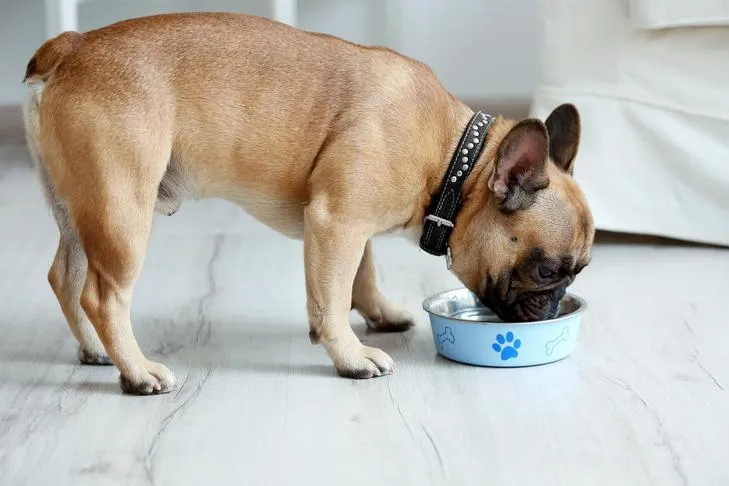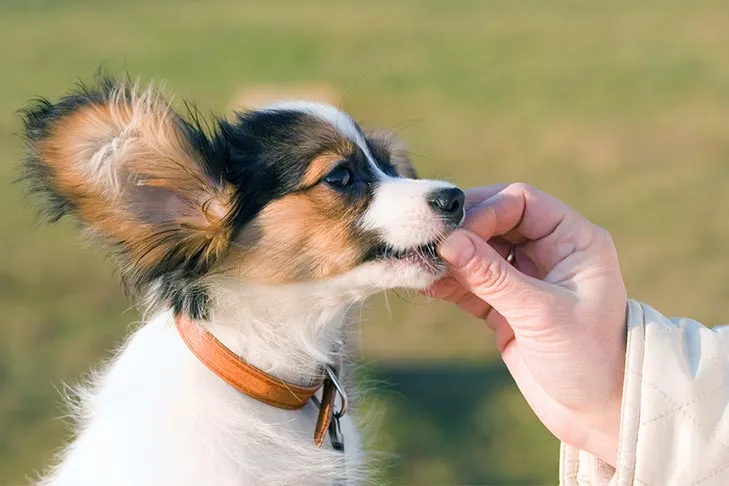Sharing meals with our beloved canine companions is a common desire for many pet owners. There’s a certain joy in seeing your dog enjoy a small piece of what you’re eating. However, it’s crucial to understand that not all human foods are safe or beneficial for dogs. While some can offer nutritional advantages, others can be highly toxic, leading to severe health issues or even be fatal. Navigating the world of human foods for dogs requires careful consideration and knowledge to ensure your furry friend stays healthy and happy. This comprehensive guide will delve into [what foods can dogs eat and cannot eat](https://dogcarestory.com/what-foods-can-dogs-eat-and-cannot-eat/), helping you make informed decisions about your dog’s diet and avoid potential dangers.
Safe Human Foods for Dogs
Many human foods, when prepared correctly and offered in moderation, can be a healthy and enjoyable addition to your dog’s diet. These foods can provide essential nutrients, offer a satisfying treat, and even help with specific health concerns. Always remember to introduce new foods slowly and observe your dog for any adverse reactions.
Bread
Small quantities of plain bread are generally harmless for your dog, provided it is free from spices, especially dangerous ingredients like [raisins](https://www.akc.org/expert-advice/nutrition/can-dogs-eat-grapes/) or garlic. While it won’t offer significant health benefits, plain bread doesn’t pose an immediate threat. However, it’s important to note that bread provides minimal nutritional value and is high in carbohydrates and calories, similar to its effect on humans. Opting for homemade bread without preservatives is preferable to store-bought varieties, but overall, it’s best offered sparingly as an occasional treat rather than a dietary staple.
Cashews
Cashews can be a safe treat for dogs, but strict moderation is key. These nuts contain beneficial elements like calcium, magnesium, antioxidants, and proteins. However, despite having less fat than some other nuts, consuming too many cashews can contribute to [weight gain](https://www.akc.org/expert-advice/health/dog-food-weight/) and potential digestive upset. If you choose to offer cashews, ensure they are unsalted to prevent excessive sodium intake, which can be detrimental to a dog’s health. A few unsalted cashews can make a pleasant, occasional snack.
Cheese
In small to moderate portions, most dogs can safely enjoy cheese, assuming they don’t have lactose intolerance, which, while rare, can occur. Cheese can serve as an excellent high-value treat, particularly for training. Due to its often high-fat content, it’s advisable to choose lower-fat options such as cottage cheese or mozzarella. Many dogs also appreciate specialized [Himalayan dog chews](https://chewy.sjv.io/jeLoae) made from dried cheese, which offer a long-lasting, digestible option. Always introduce cheese slowly to monitor for any digestive sensitivities.
 All American Dog resting its head on the kitchen table looking at cheese.
All American Dog resting its head on the kitchen table looking at cheese.
Coconut
This versatile fruit offers several health advantages for dogs. Coconut contains lauric acid, known for its potential to help combat bacteria and viruses, contributing to a stronger immune system. Furthermore, coconut can assist in freshening bad breath and improving various skin conditions, including [hot spots](https://www.akc.org/expert-advice/health/hot-spots-on-dogs/), [flea allergies](https://www.akc.org/expert-advice/health/dog-skin-allergies/), and [itchy skin](https://www.akc.org/expert-advice/health/why-is-my-dog-so-itchy/). Both coconut milk and [coconut oil](https://www.akc.org/expert-advice/health/coconut-oil-dogs/) are safe for canine consumption. However, always ensure to remove the fibrous outer shell, as it can be a choking hazard or cause internal blockages if ingested.
Corn
Corn is a widely used ingredient, even forming a base for [many commercial dog foods](https://www.akc.org/expert-advice/nutrition/essential-dog-food-ingredients-for-healthy-dogs/), which highlights its safety and nutritional value for dogs. It provides carbohydrates and essential nutrients. However, the cob itself presents a significant danger. A dog’s digestive system struggles with the fibrous cob, and it can easily become lodged in the intestines, causing a severe and potentially life-threatening obstruction. Therefore, if you share corn with your dog, always ensure it is removed completely from the cob.
Eggs
Fully cooked eggs are an excellent and safe source of protein for dogs. They are highly digestible and can even be soothing for an upset stomach. Eggs provide essential amino acids and vitamins. It is crucial, however, to ensure eggs are thoroughly cooked. Raw egg whites contain avidin, an enzyme that can interfere with biotin absorption, potentially leading to a biotin deficiency over time. Cooking the eggs denatures avidin, making them safe and nutritious for your pet.
Fish
Fish offers a wealth of good fats and amino acids, providing a substantial health boost for your dog. Salmon and sardines are particularly beneficial. Salmon is rich in omega-3 fatty acids, which support joint health, coat quality, and cognitive function, as well as being packed with vitamins and protein. Sardines, with their soft, digestible bones, provide an excellent source of calcium. For most other types of fish, it’s essential to meticulously remove all tiny bones, as they can splinter and cause internal injury. Always feed fish that is fully cooked and cooled; never offer uncooked or undercooked fish. Limit fish intake to no more than twice a week to maintain a balanced diet. It’s also important to consider [what can dogs eat on a raw diet](https://dogcarestory.com/what-can-dogs-eat-on-a-raw-diet/) for other protein sources.
Ham
While ham is generally considered safe for dogs to consume, it’s not the healthiest option for regular feeding. Its high sodium and fat content mean that a small piece on occasion is acceptable, but it should not become a continuous habit. Excessive salt can lead to dehydration and other health issues, while high fat can contribute to pancreatitis. If you offer ham, ensure it is plain, cooked, and free from any seasonings, glazes, or bones.
 French Bulldog eating from a bowl at home.
French Bulldog eating from a bowl at home.
Honey
Honey is a remarkable natural substance, brimming with numerous nutrients including vitamin A, potassium, calcium, magnesium, copper, and beneficial antioxidants. Offering dogs small amounts of local honey can even help alleviate [seasonal allergies](https://www.akc.org/expert-advice/health/dog-allergies-symptoms-treatment/) by gradually introducing small amounts of pollen, thereby building up immunity to local allergens. Beyond ingestion, honey’s natural antibacterial properties also make it a valuable topical treatment for minor [burns](https://www.akc.org/expert-advice/health/first-aid-for-a-dog-burns/) and superficial cuts on a dog’s skin.
Milk
Dogs can have milk, but caution is advised. While a small amount of milk is generally fine, many dogs are lactose intolerant, meaning their digestive systems lack the enzyme to properly break down lactose in dairy products. This can lead to digestive upset, including [diarrhea](https://www.akc.org/expert-advice/health/dog-diarrhea/) and gas. Owners should be vigilant for symptoms of lactose intolerance and might find it safer to stick to water for hydration, especially if their dog shows sensitivity.
Peanut Butter
Peanut butter can be an excellent and highly appealing source of protein for dogs. It contains heart-healthy fats, vital B vitamins, vitamin E, and niacin, all contributing to your dog’s overall well-being. The healthiest option is raw, unsalted peanut butter. Critically, always read the label carefully to ensure the peanut butter does not contain [xylitol](https://www.akc.org/expert-advice/health/dangers-of-xylitol/), an artificial sweetener that is highly toxic and potentially fatal to dogs, even in small amounts.
Peanuts
Unlike almonds, which can be difficult for dogs to digest, plain [peanuts are safe for dogs](https://www.akc.org/expert-advice/nutrition/can-dogs-eat-peanuts/) to eat. They are packed with beneficial fats and proteins that can contribute to your dog’s health. However, as with cashews, moderation is key to prevent your dog from consuming too much fat, which can lead to [pancreatitis](https://www.akc.org/expert-advice/health/pancreatitis-in-dogs/) or other digestive issues. It is also crucial to avoid salted peanuts, as excessive salt intake is difficult for dogs to process and can lead to health problems.
Popcorn
Unsalted, unbuttered, and air-popped popcorn can be an acceptable snack for your dog in moderation. It contains riboflavin and thiamine, which are important for promoting eye health and supporting healthy digestion. Additionally, it offers small amounts of iron and protein. It’s imperative to ensure all kernels are fully popped before offering them to your dog, as unpopped kernels can pose a serious [choking hazard](https://www.akc.org/expert-advice/health/dog-choking-what-to-do/) or lead to dental issues.
Pork
Pork is a highly digestible protein source for dogs, rich in essential amino acids necessary for muscle development and overall health. While it does contain more calories per pound compared to some other meats, making portion control important, it can be a valuable addition to a dog’s diet. Notably, pork may also be less likely to trigger allergic reactions in some sensitive pets compared to more common proteins like chicken or beef. When preparing, ensure it’s cooked thoroughly and free of seasonings. For more on safe meat options, consider [what types of bones can dogs eat](https://dogcarestory.com/what-types-of-bones-can-dogs-eat/).
Quinoa
Quinoa, a highly nutritious pseudocereal, is increasingly being incorporated into high-quality dry dog foods. Its robust nutritional profile makes it a healthy and beneficial alternative to commonly used starches like corn, wheat, and soy in kibble. Quinoa provides a complete protein, along with fiber, magnesium, and other essential nutrients, supporting a balanced diet for dogs. Its gluten-free nature also makes it suitable for dogs with sensitivities to grains.
 Samoyed puppy laying in the grass outdoors.
Samoyed puppy laying in the grass outdoors.
Salmon
As previously mentioned, fully cooked salmon is an outstanding source of protein, healthy fats, and essential amino acids for dogs. It actively promotes strong joint health, sharp brain function, and provides a significant boost to a dog’s immune system. However, the distinction between cooked and raw salmon is critical. Raw or undercooked salmon can harbor parasites that cause [salmon poisoning disease](https://www.akc.org/expert-advice/health/salmon-poisoning-in-dogs/), a severe and potentially fatal condition characterized by [vomiting](https://www.akc.org/expert-advice/health/dog-vomiting-causes-diagnosis-and-treatment/), [diarrhea](https://www.akc.org/expert-advice/health/dog-diarrhea/), and [dehydration](https://www.akc.org/expert-advice/health/warning-signs-dehydration-dogs/). Thorough cooking effectively eliminates these parasites, making salmon safe for consumption.
Shrimp
A few shrimp offered occasionally are perfectly acceptable for your dog, provided they are fully cooked and completely shelled, with the tail, head, and legs removed. Shrimp are rich in antioxidants, vitamin B-12, and phosphorus, all of which contribute to your dog’s health. They are also relatively low in fat, calories, and carbohydrates, making them a lean and nutritious treat. Always ensure they are unseasoned and cooked thoroughly to prevent any digestive upset or bacterial exposure.
Tuna
Dogs can consume tuna, but only in small, controlled amounts. When fed in moderation, cooked, fresh tuna is an excellent source of omega-3 fatty acids, which are crucial for promoting heart health and maintaining good eyesight. Regarding canned tuna, it contains small amounts of mercury and sodium, which should be avoided in excess. A small quantity of canned tuna (packed in water, not oil, and without added spices) and its juice can be given occasionally as a treat, but it should not be a regular part of their diet.
Turkey
Plain, cooked turkey is safe for dogs to eat. When preparing it for your pet, it’s essential to remove any excess fat and skin from the meat, as these can be difficult for dogs to digest and contribute to pancreatitis. Crucially, always double-check for bones; poultry bones can splinter easily during digestion, leading to internal blockages or even tears in the intestines, which are severe medical emergencies. Furthermore, any meat containing excessive salt, seasonings, onions, or garlic should be strictly avoided due to their toxic properties.
Wheat or Grains
Contrary to popular belief, not all dogs require a grain-free diet, and it is perfectly healthy for most dogs to consume grains. In fact, grains like [wheat](https://www.akc.org/expert-advice/nutrition/can-dogs-eat-wheat/) and corn are valuable sources of protein, essential fatty acids, and fiber, contributing to digestive health and sustained energy. However, if your dog has known specific allergies or sensitivities to grains, it might be best to avoid them. In such cases, always consult your veterinarian for personalized dietary recommendations tailored to your dog’s unique needs.
Yogurt
Plain, unsweetened yogurt is a perfectly acceptable and often beneficial snack for dogs. It is a good source of protein and calcium. However, similar to milk, some dogs may experience difficulty digesting dairy products due to lactose intolerance. If your dog can tolerate dairy, the active bacteria (probiotics) found in plain yogurt can help strengthen their digestive system, promoting a healthy gut flora. Always choose plain varieties and strictly avoid any yogurts with added sugar, artificial sweeteners (especially [xylitol](https://www.akc.org/expert-advice/health/dangers-of-xylitol/)), or fruit flavorings, as these can be harmful.
 Papillon puppy gently taking a treat from a hand.
Papillon puppy gently taking a treat from a hand.
Dangerous Human Foods for Dogs
While many human foods offer safe and healthy options for our dogs, it is absolutely essential for every pet owner to be aware of which foods are dangerous. Some common ingredients in our kitchens can cause severe illness, distress, or even be fatal to dogs. Knowing these critical distinctions can prevent tragic accidents and ensure your dog’s safety. For a more detailed listing, consider our comprehensive [list of what foods dogs should not eat](https://dogcarestory.com/list-of-what-foods-dogs-should-not-eat/).
Foods such as chocolate, grapes, raisins, onions, garlic, avocados, and any products containing [xylitol](https://www.akc.org/expert-advice/health/dangers-of-xylitol/) are highly toxic to dogs and should be kept strictly out of their reach. Even small amounts can lead to serious health complications, from digestive upset and organ damage to life-threatening conditions. Cooked bones, especially from poultry, can splinter and cause internal injuries. Alcohol, caffeine, and excessive salt are also extremely harmful. Furthermore, certain types of [meat should you not give to dogs](https://dogcarestory.com/what-meat-should-you-not-give-to-dogs/) if they are raw or heavily processed. If you suspect your dog has ingested any of these toxic items, contact your veterinarian or an animal poison control center immediately, even if they don’t show symptoms yet.
Conclusion
Understanding What Foods Dogs Can And Cannot Eat is a cornerstone of responsible pet ownership. While the joy of sharing food with your canine companion is undeniable, prioritizing their health and safety must always come first. By familiarizing yourself with the safe human foods—and remembering to offer them in moderation and prepared correctly—you can add variety and beneficial nutrients to your dog’s diet. More importantly, being acutely aware of the dangerous and toxic foods is paramount to preventing potentially life-threatening emergencies. Always consult your veterinarian before introducing significant changes to your dog’s diet or if you have any concerns about specific foods. For further insights and expert advice on canine nutrition and care, explore more articles on Dog Care Story to empower yourself with the knowledge needed to ensure your beloved pet lives a long, healthy, and happy life.
